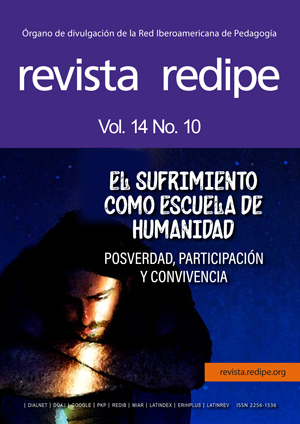Del reconocimiento a la evaluación crítica: Efectos de una estrategia de desarrollo profesional en argumentación científica en educación superior
##plugins.themes.bootstrap3.article.main##
Keywords
Argumentación científica, Toulmin, Evaluación formativa, Educación superior, Desarrollo profesional docente
Resumen
Este estudio presenta los resultados de una estrategia de desarrollo profesional para fortalecer la capacidad de docentes universitarios en la evaluación y retroalimentación de la argumentación científica. Participaron cinco profesores de ciencias en un proceso dividido en tres módulos: ensayos reflexivos, diseño de actividades argumentativas y aplicación del instrumento Del Conocimiento del Contenido Pedagógico de la Argumentación (PCK-A). El análisis combinó categorías cualitativas con estadísticas descriptivas. Los hallazgos muestran un avance gradual: se reconoce la importancia de argumentar en clase, se transforman situaciones cotidianas en problemas científicos y se incorpora la estructura de Toulmin para enriquecer el análisis y el debate, lo que finalmente conduce a decisiones que integran teoría y práctica. Se evidencian mejoras en el uso de evidencias y en el diálogo, aunque persisten retos para explicar garantías y refutar sin criterios claros. Hacer explícita la estructura de Toulmin y emplear rúbricas por componente se plantea como clave para consolidar la práctica de la argumentación y convertir las debilidades en oportunidades de mejora.
Referencias
Briceño-Martínez, J. J. (2013). La argumentación y la reflexión en los procesos de mejora de los profesores universitarios colombianos de ciencia en activo: aplicación de estrategias formativas sobre ciencia, aprendizaje y enseñanza [Tesis doctoral]. Universidad de Granada.
Briceño-Martínez, J. J., & Benarroch, A. (2012). Concepciones y creencias sobre ciencia, aprendizaje y enseñanza de profesores universitarios de ciencias. REIEC, 8(1), 24– 41. https://doi.org/10.54343/reiec.v8i1.122
Bricker, L. A., & Bell, P. (2008). Conceptualizations of argumentation from science studies and the learning sciences and their implications for the practices of science education. Science Education, 92(3), 473–498. https:// doi.org/10.1002/sce.20278
Cabrera Lanzo, N., Guàrdia Ortiz, L., & Sangrà, A. (2022). Desarrollo profesional de docentes universitarios en línea: un análisis desde las ecologías de aprendizaje. Educar, 58(2), 321–336. https://doi.org/10.5565/rev/ educar.1528
Chai, C. S., Koh, J. H. L., & Tsai, C.-C. (2013). A review of technological pedagogical content knowledge. Educational Technology & Society, 16(2), 31–51. https://www.jstor.org/ stable/jeductechsoci.16.2.31
Chen, Y.-C., Benus, M. J., & Hernandez, J. (2019). Managing uncertainty in scientific argumentation. Science Education, 103(5), 1235–1276. https://doi.org/10.1002/ sce.21527
Corbin, J. & Strauss, A. (2008). Fundamentos de la investigación cualitativa: Técnicas y procedimientos para el desarrollo de la teoría fundamentada (3.ª ed.). Sage Publications, Inc. https://doi. org/10.4135/9781452230153
Darling-Hammond, L., Hyler, M. E., & Gardner, M. (2017). Effective teacher professional development. Learning Policy Institute. https://learningpolicyinstitute.org/ product/effective-teacher-professionaldevelopment-report
Driver, R., Newton, P., & Osborne, J. (2000). Establishing the norms of scientific argumentation in classrooms. Science Education, 84(3), 287–312. https://doi.org/10.1002/(SICI)1098- 237X(200005)84:33.0.CO;2-A
Erduran, S., & Jiménez-Aleixandre, M. P. (Eds.). (2007). Argumentation in science education: Perspectives from classroombased research. Springer. https://doi. org/10.1007/978-1-4020-6670-2
Erduran, S., Ozdem, Y., & Park, J. Y. (2015). Research trends on argumentation in science education: A journal content analysis from 1998–2014. International Journal of STEM Education, 2(1). https:// doi.org/10.1186/s40594-015-0020-1
Erduran, S., Simon, S., & Osborne, J. (2004). TAPping into argumentation: Developments in the use of Toulmin’s Argument Pattern in studying science discourse. Science Education, 88(6), 915–933. https://doi. org/10.1002/sce.20012
Felton, M., Levin, D. M., De La Paz, S., & Butler, C. (2022). Scientific argumentation and responsive teaching: Using dialog to teach science in three middle-school classrooms. Science Education, 106(6), 1354–1374. https://doi.org/10.1002/sce.21740
Fishman, E. J., Borko, H., Osborne, J., Gomez, F., Rafanelli, S., Reigh, E., Tseng, A., Million, S., & Berson, E. (2017). A practice based professional development program to support scientific argumentation from evidence in the elementary classroom. Journal of Science Teacher Education, 28(3), 222–249. https://doi.org/10.1080/10 46560X.2017.1302727
Gibbs, G., & Coffey, M. (2004). The impact of training of university teachers on their teaching skills, their approach to teaching and the approach to learning of their students. Active Learning in Higher Education, 5(1), 87–100. https://doi. org/10.1177/1469787404040463
González-Howard, M., & McNeill, K. L. (2019). Teachers’ framing of argumentation goals: Working together to develop individual versus communal understanding. Journal of Research in Science Teaching, 56(6), 821–844. https://doi.org/10.1002/tea.21530
Gray, R., & Kang, N. H. (2014). The structure of scientific arguments by secondary science teachers: Comparison of experimental and historical science topics. International Journal of Science Education, 36(1), 46– 65. https://doi.org/10.1080/09500693.2012 .715779
Hattie, J., & Timperley, H. (2007). The power of feedback. Review of Educational Research, 77(1), 81–112. https://doi. org/10.3102/003465430298487
Jiménez-Aleixandre, M. P., & Díaz, J. (2003). Discurso de aula y argumentación en la clase de ciencias: cuestiones teóricas y metodológicas. Investigación Didáctica, 21(3), 359–370. http://hdl.handle. net/10347/20698
Jiménez-Aleixandre, M. P., & Erduran, S. (2007). Argumentation in science education: An overview. En S. Erduran & M. P. JiménezAleixandre (Eds.), Argumentation in Science Education: Perspectives from Classroom-Based Research (pp. 3–27). Springer. https://doi.org/10.1007/978-1- 4020-6670-2_1
Kelly, G. J., & Takao, A. (2002). Epistemic levels in argument: An analysis of university oceanography students’ use of evidence in writing. Science Education, 86(3), 314–342. https://doi.org/10.1002/sce.10024
Kim, S., & Hand, B. (2015). An analysis of argumentation discourse patterns in elementary teachers’ science classroom discussions. Journal of Science Teacher Education, 26(3), 221–236. https://doi. org/10.1007/s10972-014-9416-x
Knight, P. (2002). Being a Teacher in Higher Education. McGraw-Hill Education.



